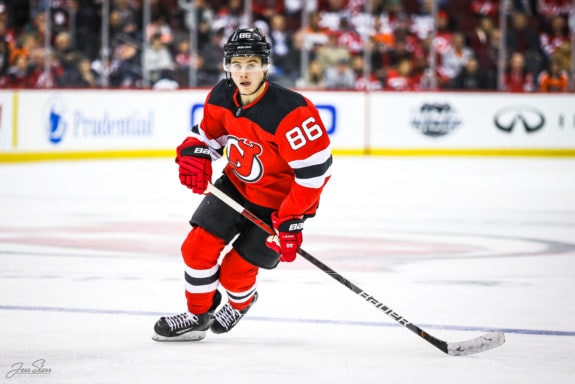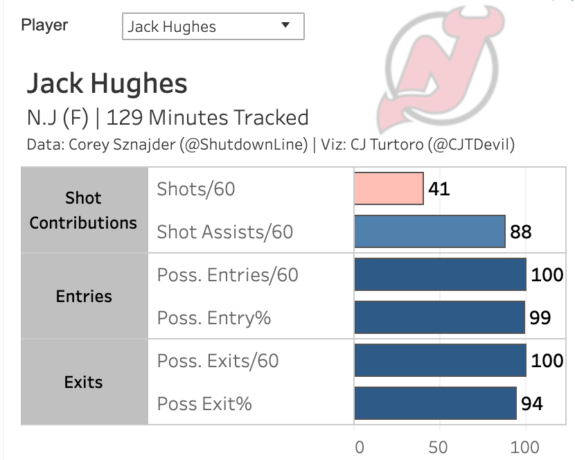Jack Hughes’ rookie season did not go as anticipated. The 2019 first overall pick finished with 21 points in 64 games, well short of what you’d expect from a first overall selection. That total was also the least for a top pick since Patrik Stefan finished with 25 points in 72 games during the 1999-00 season.
Stefan went on to play just seven NHL seasons and was out of the league by age 26. But rest assured, there’s no reason to believe Hughes is on the same trajectory. Despite the underwhelming rookie season and some poor luck, Hughes did a lot of things well. And once he matures physically, he should be the star many expect him to be.
Devils’ Turmoil Affected Hughes
A lot of things went wrong for the Devils early in the season, and that affected Hughes, as well. He started on the second line with Jesper Bratt and Nikita Gusev — one of the Devils’ prized offseason acquisitions. But the trio never gelled and was broken up after a mere two games together.
From there, Hughes found his footing with Pavel Zacha and Wayne Simmonds, but he’d go on to have several different line combos moving forward. For the most part, he never centered a scoring line. Though then-head coach John Hynes did give Hughes a run with Taylor Hall and Kyle Palmieri, where he had arguably the most success this season (more on that in a bit).
Because of his struggles, interim coach Alain Nasreddine gave Hughes a run at left-wing in the final weeks of the season, but the experiment was a disaster. Hughes had a Corsi share (CF%) of 39.29% and expected goals share (xGF%) of 41.04% in 11 games as a winger. His offense also dried up (one point in 11 games), and he never looked comfortable playing the position.

But there are some silver linings when looking at the big picture. When playing center, Hughes had a 47.3 CF% and 48.84 xGF%, which is respectable for an 18-year-old rookie. I mentioned Hughes was the victim of some bad luck; the Devils had just a 5.2 shooting percentage when he was on the ice. Only Jesper Boqvist had a lower on-ice SH% (2.88%).
Part of the reason for Hughes’ low on-ice SH% was because of who played alongside him. His most common linemates on the season were Simmonds and Zacha, neither of whom have even average shooting talent. Had he been playing with more capable goal-scorers, it’s quite likely his on-ice SH% would’ve been much higher than it was.
Related: New Jersey Devils: Top 10 Rookie Seasons
And there’s evidence Hughes would’ve benefited from playing with scoring wingers. In 109 minutes at five-on-five with Hall, Hughes, and Palmieri as a line, the Devils had a 56.7 CF% and 63.22 xGF%. Swap Hall out for Bratt on a line with Hughes and Palmieri and their xGF% was 54.64%.
Hughes Will Have the Tools to Succeed
Although Hughes only mustered up 21 points on the season, he still excelled in the areas that made him a first overall pick. One of his strengths as a prospect with the USNTDP was being a zone exit and entry machine. And that translated over to the NHL even as a rookie, where he did it at a high level.
Hughes ranked in the 100th percentile in possession entries and exits per 60 minutes. He also ranked in the 99th percentile in possession entry percentage, as well as the 94th percentile in possession exit percentage. And his playmaking ability was on display, as he ranked in the 88th percentile in shot assists/60 minutes.

Much has been made of Hughes’s weight too. He’s 5-foot-10, 170 pounds, but plenty of players get away with being “undersized” in today’s NHL. That said, he’ll benefit from adding some muscle to handle the physical rigors of pro hockey. That’ll come with time, especially if there’s an extended layoff that leads to the 2020-21 season starting in January.
But while Hughes has to do his part bulking up, the Devils need to help him out on the ice, as well. For the majority of the season, he played with wingers who were not great fits as linemates. So whoever the next coach is will have to put him in better positions to succeed.
Related: Devils Should Keep Diving Into European Draft Waters
And by the looks of it, the Devils will have a new coaching staff in place for next season. The rumored favorites appear to be Peter Laviolette and Gerard Gallant, though Nasreddine has a shot at getting the gig permanently too. But it’s the former two coaches who’d likely have a more significant impact getting Hughes going, considering they’ve had success at all their NHL coaching stops. Plus, the change to a new system should benefit the whole team.
The bottom line is Hughes will be fine. Improvements to the roster, and perhaps the coaching staff, will help. He was also the first player to ever make the jump from the USNTDP to the NHL. But there’s no doubt the signs are there to believe he’s going to be the star many have pegged to him be. It may not have happened as a rookie, but don’t be surprised if it does sooner than later.
* * *
Advanced stats from Natural Stat Trick